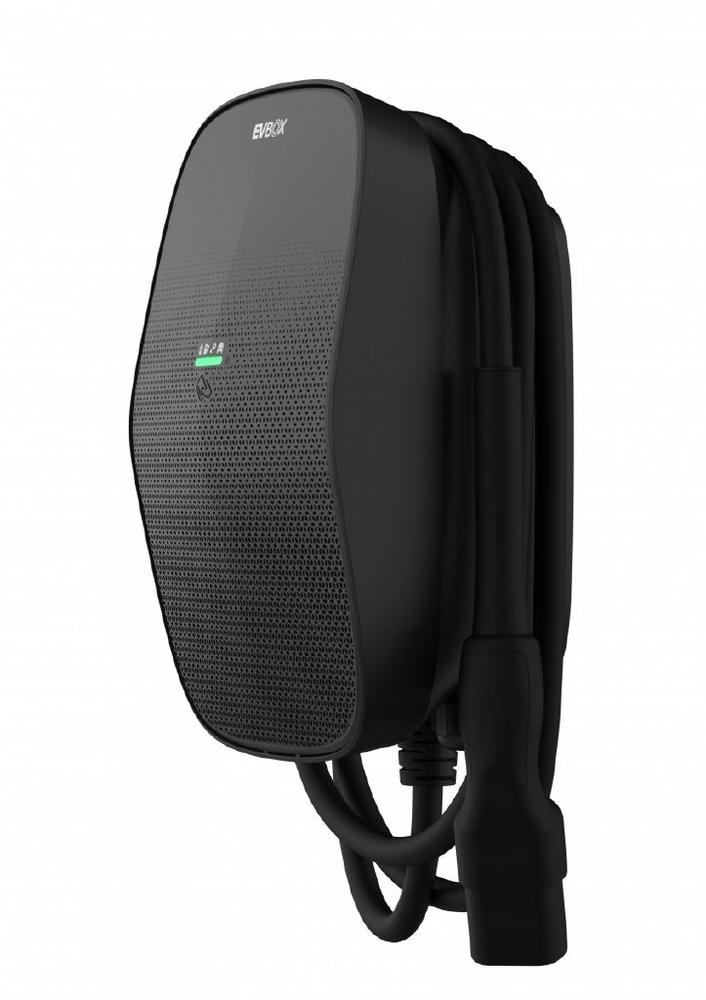- Low emissions already during production of charging stations
- Co-listing with UL enables fast material exchange
- High-quality technical property profile
The new, more sustainable Makrolon® RE polycarbonates from Covestro are celebrating their premiere in an electromobility application, which the company will present at the K 2022 plastics trade fair. EVBox, a global player headquartered in the Netherlands, is manufacturing the entire housing of its new EVBox Livo wallbox from a compound of the new product series. Makrolon® RE is produced proportionately from biowaste and residual materials, partly using renewable electricity, and therefore has a very low carbon footprint. As thermoplastics, the more sustainable polycarbonates are also easy to recycle and therefore well suited to building up material cycles.
"This application is another milestone in our long-standing cooperation with EVBox. Together, we have achieved that fossil resources are not only saved when driving with green electricity, but already during the production of charging stations," explains Dr. Niklas Meine, head of the global project EV Charging Stations and Marketing Electrical and Electronics in the EMEA region at Covestro.
"EVBox develops charging solutions for electric vehicles with the future of our planet in mind. With our new charging station, we are taking a big step forward in further decoupling mobility from resource depletion and putting it on a more sustainable footing," added Wijnand Diemer, Senior Director Product Management at EVBox, one of the world’s leading full-service providers for electric vehicle charging.
Great potential for CO2 savings in charging stations
The sustainability of Makrolon® RE is demonstrated by a partial life cycle analysis tested by TÜV Rheinland. If 3.5 kilograms of fossil-based Makrolon® is replaced with an RE counterpart with an assigned biocircular material content of more than 70 percent, the carbon footprint of the charging station is reduced by approximately 10 kilograms of CO2 equivalents. "If all charging station housings worldwide were made from Makrolon® RE instead of conventional materials, a total of around 450,000 metric tons less CO2 equivalents could be emitted between 2022 and 2030," Meine explains.
Flame retardant and weather resistant
The RE compounds are identical to their fossil-based counterparts and have the same material properties. Therefore, they can be used directly as drop-in solutions for substitution. "The switch to RE products does not involve time-consuming and costly testing and certification procedures and can therefore be manufactured very quickly. For example, the compounds are listed on the Yellow Card of the U.S. testing institute Underwriters Laboratories Inc. (UL) along with their fossil analogues," explains Meine. The RE polycarbonate used for EVBox Livo offers tailor-made properties for charging stations. Its high flame resistance is reflected in a 5VA rating (Yellow Card) in the UL 94 fire test. It is also UL f1 listed and can therefore be used outdoors under water and UV exposure.
Mass balance ensures transparency
The sustainable origin of the raw materials for Makrolon® RE is mass balanced and certified according to ISCC Plus (International Sustainability and Carbon Certification). "We can therefore show the proportion of sustainable material in the compound precisely and transparently for the processor. With mass balancing, we support the transition to a circular economy based on renewable or recycled raw materials," Meine explains.
Durability and distinctive brand design
Many leading manufacturers of charging stations already use fossil-based variants of Makrolon® to produce housings and other components. The reason for this is that the construction material resists moisture, heat and cold well, can be stabilized against UV radiation and does not corrode. In addition, it is electrically insulating, its impact resistance makes it robust against vandalism, for example, and it can be made particularly flame-retardant. With this property profile, the material contributes to a long life and service life of the charging stations, which also benefits their sustainability. Another key strength of polycarbonate is that it opens up a wide range of design freedoms for housing surfaces in terms of color, structuring and printing, and also enables the integration of capacitive touch functions such as switches and of lighting elements. Many manufacturers of charging stations use this design freedom to individualize their products and equip them with a distinctive brand design.
Forward-looking statements
This news release may contain forward-looking statements based on current assumptions and forecasts made by Covestro AG. Various known and unknown risks, uncertainties and other factors could lead to material differences between the actual future results, financial situation, development or performance of the company and the estimates given here. These factors include those discussed in Covestro’s public reports which are available at www.covestro.com. The company assumes no liability whatsoever to update these forward-looking statements or to conform them to future events or developments.
Covestro is one of the world’s leading manufacturers of high-quality polymer materials and their components. With its innovative products, processes and methods, the company helps enhance sustainability and the quality of life in many areas. Covestro supplies customers around the world in key industries such as mobility, building and living, as well as the electrical and electronics sector. In addition, polymers from Covestro are also used in sectors such as sports and leisure, cosmetics and health, as well as in the chemical industry itself.
The company is committed to becoming fully circular and is striving to become climate neutral by 2035 (scope 1 and 2). Covestro generated sales of EUR 15.9 billion in fiscal 2021. At the end of 2021, the company had 50 production sites worldwide and employed approximately 17,900 people (calculated as full-time equivalents).
Covestro AG
Friedrich-Ebert-Straße 350
51373 Leverkusen
Telefon: +49 (214) 60092000
http://www.covestro.com/
Externe Kommunikation / Fachpresse
Telefon: +49 (214) 30-25363
Fax: +49 (214) 30-66426
E-Mail: Frank.Rothbarth@covestro.com
Telefon: +49 (214) 6009-6697
E-Mail: Markus.Kleine-Beck@covestro.com
![]()
